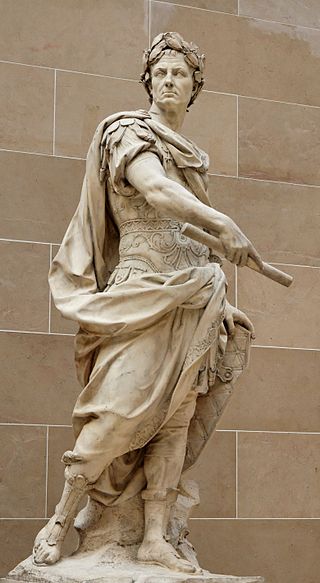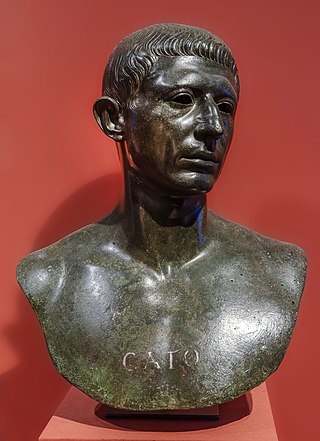
The Roman Republic was the era of classical Roman civilization beginning with the overthrow of the Roman Kingdom and ending in 27 BC with the establishment of the Roman Empire following the War of Actium. During this period, Rome's control expanded from the city's immediate surroundings to hegemony over the entire Mediterranean world.

The following outline is provided as an overview of and topical guide to ancient Rome:

A scribe is a person who serves as a professional copyist, especially one who made copies of manuscripts before the invention of automatic printing.
Bona Dea was a goddess in ancient Roman religion. She was associated with chastity and fertility among married Roman women, healing, and the protection of the state and people of Rome. According to Roman literary sources, she was brought from Magna Graecia at some time during the early or middle Republic, and was given her own state cult on the Aventine Hill.

The toga, a distinctive garment of ancient Rome, was a roughly semicircular cloth, between 12 and 20 feet in length, draped over the shoulders and around the body. It was usually woven from white wool, and was worn over a tunic. In Roman historical tradition, it is said to have been the favored dress of Romulus, Rome's founder; it was also thought to have originally been worn by both sexes, and by the citizen-military. As Roman women gradually adopted the stola, the toga was recognized as formal wear for male Roman citizens. Women found guilty of adultery and women engaged in prostitution might have provided the main exceptions to this rule.
Publius Clodius Pulcher was a Roman politician and demagogue. A noted opponent of Cicero, he was responsible during his plebeian tribunate in 58 BC for a massive expansion of the Roman grain dole as well as Cicero's exile from the city. Leader of one of the political mobs in the 50s, his political tactics – combining connections throughout the oligarchy with mass support from the poor plebs – made him a central player in the politics of the era.

Marcus Porcius CatoUticensis, also known as Cato the Younger, was an influential conservative Roman senator during the late Republic. His conservative principles were focused on the preservation of what he saw as old Roman values in decline. A noted orator and a follower of Stoicism, his scrupulous honesty and professed respect for tradition gave him a political following which he mobilised against powerful generals of his day, including Julius Caesar and Pompey.

Various lists regarding the political institutions of ancient Rome are presented. Each entry in a list is a link to a separate article. Categories included are: constitutions (5), laws (5), and legislatures (7); state offices (28) and office holders ; political factions and social ranks (8). A political glossary (35) of similar construction follows.

The College of Pontiffs was a body of the ancient Roman state whose members were the highest-ranking priests of the state religion. The college consisted of the pontifex maximus and the other pontifices, the rex sacrorum, the fifteen flamens, and the Vestals. The College of Pontiffs was one of the four major priestly colleges; originally their responsibility was limited to supervising both public and private sacrifices, but as time passed their responsibilities increased. The other colleges were the augures, the quindecimviri sacris faciundis , and the epulones.

A consular tribune was putatively a type of magistrate in the early Roman Republic. According to Roman tradition, colleges of consular tribunes held office throughout the fifth and fourth centuries BC during the so-called "Conflict of the Orders". The ancient historian Livy offered two explanations: the Roman state could have needed more magistrates to support its military endeavours; alternatively, the consular tribunate was offered in lieu of the ordinary consulship to plebeians so to maintain a patrician lock on the consulship.

Social class in ancient Rome was hierarchical, with multiple and overlapping social hierarchies. An individual's relative position in one might be higher or lower than in another, which complicated the social composition of Rome.
Gnaeus Flavius was the son of a freedman (libertinus) and rose to the office of aedile in the Roman Republic.

Ludi were public games held for the benefit and entertainment of the Roman people . Ludi were held in conjunction with, or sometimes as the major feature of, Roman religious festivals, and were also presented as part of the cult of state.
Leges Clodiae were a series of laws (plebiscites) passed by the Plebeian Council of the Roman Republic under the tribune Publius Clodius Pulcher in 58 BC. Clodius was a member of the patrician family ("gens") Claudius; the alternative spelling of his name is sometimes regarded as a political gesture. With the support of Julius Caesar, who held his first consulship in 59 BC, Clodius had himself adopted into a plebeian family in order to qualify for the office of tribune of the plebs, which was not open to patricians. Clodius was famously a bitter opponent of Cicero.

The gens Cloelia, originally Cluilia, and occasionally written Clouilia or Cloulia, was a patrician family at ancient Rome. The gens was prominent throughout the period of the Republic. The first of the Cloelii to hold the consulship was Quintus Cloelius Siculus, in 498 BC.
The gens Canidia was an obscure plebeian family at ancient Rome, first mentioned during the late Republic. It is best known from a single individual, Publius Canidius Crassus, consul suffectus in 40 BC, and the chief general of Marcus Antonius during the Perusine War. Other Canidii are known from inscriptions. The name Canidia was also used by Horace as a sobriquet for the perfumer, Gratidia.
The prosopography of ancient Rome is an approach to classical studies and ancient history that focuses on family connections, political alliances, and social networks in ancient Rome. The methodology of Roman prosopography involves defining a group for study—often the social ranking called ordo in Latin, as of senators and equestrians—then collecting and analyzing data. Literary sources provide evidence mainly for the ruling elite. Epigraphy and papyrology are sources that may also document ordinary people, who have been studied in groups such as imperial freedmen, lower-class families, and specific occupations such as wet nurses (nutrices).

The overthrow of the Roman monarchy was an event in ancient Rome that took place between the 6th and 5th centuries BC where a political revolution replaced the then-existing Roman monarchy under Lucius Tarquinius Superbus with a republic. The details of the event were largely forgotten by the Romans a few centuries later; later Roman historians presented a narrative of the events, traditionally dated to c. 509 BC, but it is largely believed to be fictitious by modern scholars.

Gaius Furius Chresimus, or Cresimus, or Cressinus, was a 2nd-century BC Greek farmer and freedman in the Roman Republic mentioned in a fragment of the lost history of Lucius Calpurnius Piso Frugi, preserved in Pliny's Natural History. Piso tells that Furius Chresimus was acquitted of accusations of witchcraft during the aedileship of Spurius Postumius Albinus, dated 191 BC. The trial took place in a period of reaction against the growing influence of Hellenism at Rome, notably led by Albinus. Both Piso and Pliny told the story of the trial for its moralizing aspect.
The gens Albinovana was an obscure plebeian family at ancient Rome. No members of this gens are known to have held any of the higher offices of the Roman state, and hardly any are mentioned in history. The family is perhaps best known from Publius Albinovanus, an infamous participant in the civil war between Marius and Sulla, and from the first-century poet Albinovanus Pedo. A number of Albinovani are known from inscriptions.












